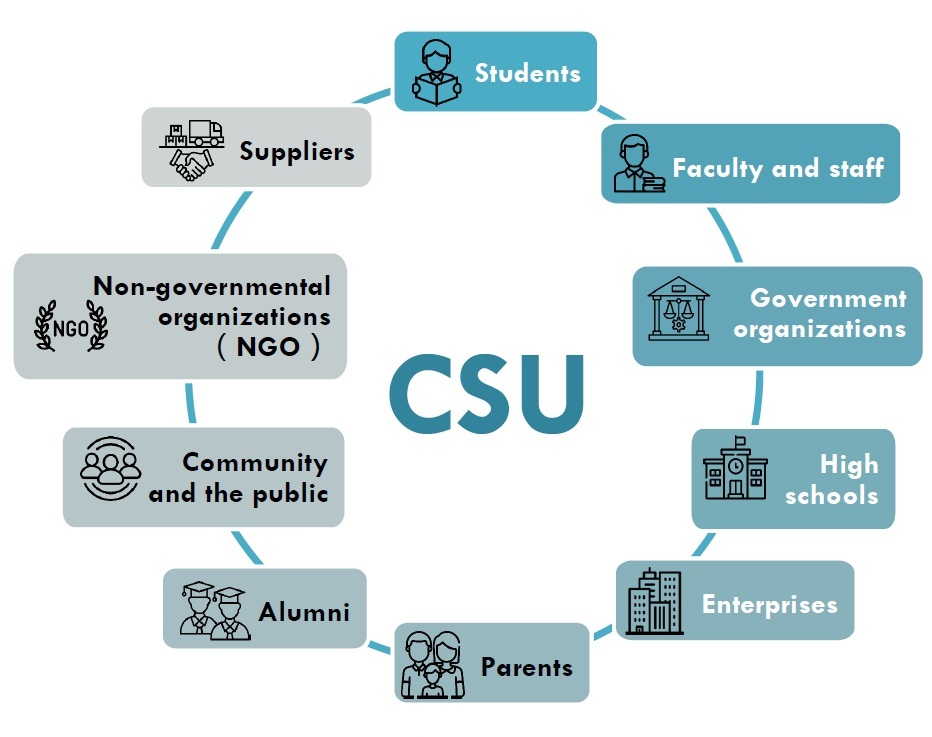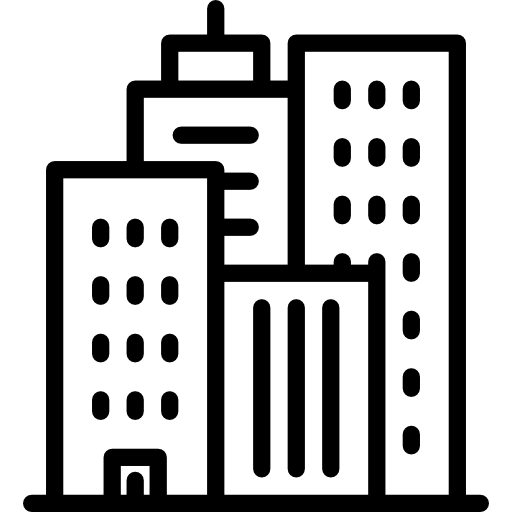Stakeholder Engagement
Identification of Stakeholders
For individuals or organizations that have a direct or indirect impact on the University, or are affected by it, Cheng Shiu University identifies ten stakeholder groups in accordance with the AA1000 Stakeholder Engagement Standard (SES) principles, as approved by the Social Responsibility and Sustainability Promotion Committee.
These groups are: students, faculty and staff, government agencies, high schools and vocational schools, enterprises, parents, alumni, local communities and the public, non-governmental organizations (NGOs), and suppliers.

Stakeholder Engagement
The University values stakeholder feedback. In addition to annually publishing the Sustainability Report and Accountability Report to address key stakeholder concerns, Cheng Shiu adopts multiple communication channels—both regular and ad hoc—tailored to different stakeholder groups. The University also operates the CSU Sustainability Website to ensure effective engagement and dialogue.
|
Type |
Their Significance to Cheng Shiu University |
Communication method and frequency |
|
Students |
Students – Core beneficiaries of educational services; their learning outcomes, satisfaction, and development directly reflect the University’s mission. |
● University Affairs Proposal System (anytime) ● Advisor Meetings (weekly) ● Teaching Feedback Surveys (once per semester) ● Office of Student Affairs (anytime) ● Student Appeals Section (anytime) |
|
Faculty And Staff |
Faculty and Staff – Key drivers of teaching, research, and administrative excellence; their expertise and engagement ensure institutional quality and innovation. |
● resident’s Mailbox (irregular) ● Official CSU Website Announcements (irregular) ● Unit Email Accounts (irregular) ● University/Academic/Departmental Meetings (at least once per semester) |
|
Government Organizations |
Government organizations – Policy-makers and funding providers; their regulations, resources, and evaluations guide compliance and strategic alignment. |
● Official Correspondence (irregular) ● Participation in central or local government public hearings, workshops, forums, or briefing sessions (irregular) ● Submission of progress or final reports (irregular) ● Project Proposal Meetings (irregular) ● Evaluations, inspections, and site visits (irregular) |
|
High Schools |
High Schools – Talent sources and academic partners; collaborative programs strengthen student recruitment and academic pathways. |
● University Visits (irregular) ● On-campus Promotions (irregular) ● Enrollment Expos (irregular) ● Curriculum Articulation Seminars (irregular) ● Strategic Alliances (irregular) |
|
Enterprises |
Enterprises – Industry collaborators; provide internship, employment, and research opportunities, linking academia to market needs. |
● Signing Ceremonies (irregular) ● Industry-Academia (Internship) Matching / Briefings & Exchange Meetings (at least twice per semester) ● Curriculum Committee Meetings (at least once per semester) ● Industry-Academia / Industrial Alliance Meetings (irregular) |
|
Parents |
Parents – Supporters and evaluators of student development; their trust reinforces the University’s educational credibility. |
● Freshman Parent Orientation (once per academic year) ● Enrollment Prospectus (once per academic year) ● Annual Accountability Report (once per academic year) ● CSU Website & Email Communication (irregular) ● Parent Service System (irregular) |
|
Alumni |
Alumni – Brand ambassadors and resource contributors; maintain lifelong ties that benefit institutional growth. |
● Alumni Association Board Meetings (at least once per year) ● Department Alumni Gatherings (irregular) ● Alumni Homecoming Events (irregular) ● University Anniversary Celebration (once per year) ● Graduate Employment Tracking Surveys (once per year) |
|
Community And the Public |
Communities & the Public – Beneficiaries of outreach, cultural, and social responsibility programs; their feedback shapes local engagement. |
● Local Briefings (irregular) ● Community Collaborations (irregular) ● Event Participation (irregular) |
|
Non-Governmental Organizations(NGO) |
Non-Governmental Organizations (NGOs) – Strategic partners in sustainability, community service, and advocacy projects. |
● Public Welfare Cooperation Meetings / Signing Ceremonies (irregular) ● Lectures & Workshops (irregular) ● Advocacy Platforms (irregular) |
|
Suppliers |
Suppliers – Providers of goods and services; their collaboration impacts operational efficiency, sustainability practices, and compliance. |
● Signing Ceremonies (irregular) ● Procurement Evaluation Meetings (irregular) ● Supplier Briefings (irregular) |
Key Communication Focus & Response Actions & Communication Outcomes
| Type | Key Communication Focus | Response Actions & Communication Outcomes |
|
Students |
● Course quality and learning outcomes ● Internship and employment opportunities ● Living support |
● In the 2023 academic year, student overall literacy satisfaction scored 4.38/5, indicating that students generally believe courses promote personal growth. ● Offered 38 interdisciplinary credit courses to encourage integration of diverse knowledge and acquisition of second specialties, with 16,598 student enrollments. ● In 2025, plans to launch a “Sustainable Development Micro-Credential Program” to foster student engagement in sustainability and social responsibility learning and practice. ● Promoted high-quality off-campus internship programs to help departments expand internship partners and positions. In the 2023 academic year, collaborated with 349 enterprises/organizations to provide workplace learning opportunities for 1,555 students. |
|
Faculty And Staff |
● Teaching resources ● Research support ● Promotion and career development ● University governance participation |
● Promoted innovative teaching models through teaching practice research, faculty professional growth communities, and incentives for textbook compilation. ● Encouraged faculty to complete at least six months of industry-based training, service, or research related to their field every six years to enhance practical teaching skills. ● Conducted regular teaching feedback surveys; in the first semester of the 2024 academic year, the average teaching evaluation score was 4.49/5, reflecting improved teaching quality. ● Strengthened the Teaching Assistant (TA) training system to enhance support effectiveness; in 2024, 440 students served as TAs, leveraging their expertise to assist learning. |
|
Government Organizations |
● Regulatory compliance ● Policy response ● Project outcomes ● Social responsibility implementation |
● Received MOE Higher Education Sprout Project funding for 7 consecutive years, with NT$240 million awarded in 2024—the highest among private technical and vocational universities. ● Conducted college self-evaluations, institutional self-assessment, and departmental evaluations under the “Teaching Quality Assurance Service Program” in 2024, ensuring continuous improvement. ● Promoted moral education and fostered a sustainable, diverse, and friendly campus culture; awarded the MOE “Friendly Campus Award – Southern Region Outstanding School” and “Moral Education Model School” in 2024. ● Demonstrated excellence in technical and vocational education; President KUNG, Jui-Chang received the MOE “Technical and Vocational Education Contribution Award.” |
|
High Schools |
● Further education guidance ● Specialized courses ● TVET alignment |
● Strengthened curriculum alignment and teaching collaboration with partner senior high and vocational schools in Southern Taiwan, holding semesterly forums to connect university and secondary school resources for shared educational benefits. ● Organized project competitions, diverse experiential workshops, and career exploration activities to help high school and vocational students understand university programs and clarify future goals. ● In 2024, 85% of students came from Kaohsiung, Pingtung, and Tainan, with total enrollment reaching 14,957. |
|
Enterprises |
● Research technology ● Industry-academia collaboration ● Talent demand and matching ● Internship system |
● Invited industry experts for co-teaching in over 300 courses annually, guiding student projects to enhance industry knowledge and foster faculty–industry collaboration. ● Established technology research centers and laboratories to provide technical services and drive industrial growth; in 2024, partnered with 1,506 companies, completing 1,606 collaborations with a total value exceeding NT$450 million. ● Cultivated industry-ready professionals, earning high employer satisfaction; in the Cheers 2025 “Most Favored Graduates” ranking, CSU rose to Taiwan’s Top 5. ● Matched students with relevant workplaces to expand quality internships, collaborating with 349 enterprises/institutions in 2024 to provide premium off-campus training sites. |
|
Parents |
● Student learning outcomes ● Tuition and financial aid ● Career development ● Campus safety |
● Held 130 career guidance events in 2024, attracting 6,162 student participants to enhance employability skills. ● Co-hosted the Campus Job Fair with the Workforce Development Agency (Kaohsiung-Pingtung-Penghu-Taitung branch), featuring 110 companies and 5,000 job openings to boost employment matching efficiency. ● Implemented a comprehensive financial aid system, awarding NT$74.64 million in scholarships to 10,725 recipients in 2024. ● Launched a parent service platform with advisor and attendance care mechanisms, strengthening parent–teacher communication and trust. |
|
Alumni |
● Alma mater development ● Workplace networking ● Resource contributions |
● Established the Alumni and Career Development Center to provide resources and services, strengthen alumni–school interaction, and increase donations and collaboration, with funds used to enhance teaching quality and student support. ● Departments formed alumni associations to boost alumni engagement; organized career talks where alumni shared market insights and industry trends with students. ● Conducted graduate employment satisfaction surveys; in 2023–2024, one-year post-graduation satisfaction averaged 4.26/5 with a 90.9% response rate. Results were shared with departments to improve teaching quality. |
|
Community And the Public |
● Local issue collaboration ● Space sharing ● Resource support |
● Built 18 USR Learning Bases in 2024, engaging 187 key stakeholders and 6,404 local participants, fostering long-term community learning and exchange. ● Mobilized academic departments and student clubs to provide services for disadvantaged and rural communities. ● Digital Buddy Program in 2024 supported six rural schools, enhancing students’ motivation and learning opportunities. ● Supported startups in the Incubation Center, offering technical and operational guidance; in 2024, 22 firms were housed, and 3 graduated. |
|
Non-Governmental Organizations(NGO) |
● Social issue collaboration ● Sustainability advocacy ● Youth engagement |
● Advanced sustainability through forums and collaborative projects with NGOs, jointly publishing results to amplify social impact. ● Launched the “Community Co-Learning Classroom” under the Dream-Realization Social Feedback Program, partnering with local care and service organizations in 2024. ● Received 105 donated artworks from the Hsiao Chin International Art Foundation; preserved by the Cultural Relics Conservation Research Center, with a special exhibition planned for Sept.–Nov. 2025. |
|
Suppliers |
● Fair trade ● Quality assurance ● Sustainable procurement |
● Implemented transparent procurement processes; in 2024, partnered with 1,337 local suppliers, achieving a 92.22% local procurement rate. ● Promoted green procurement, prioritizing energy-efficient products; in 2024, green purchases reached NT$22.78 million, showing annual growth. ● Planned a 2025 supplier evaluation to strengthen sustainability awareness, performance quality, and environmental transparency in the supply chain. |












